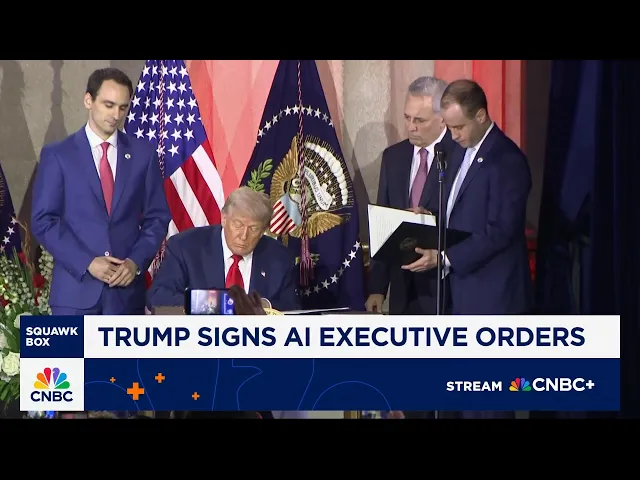Trump signs AI executive orders: Here’s what to know

Trump plans sweeping AI overhaul
In what some analysts are calling the most significant tech policy development of the upcoming term, President-elect Donald Trump has signaled plans for a dramatic overhaul of America's artificial intelligence strategy. The incoming administration aims to cement U.S. dominance in AI development through a combination of deregulation, government-driven initiatives, and strategic competition with China.
Trump's approach appears to represent a sharp departure from the Biden administration's more cautious regulatory framework, potentially unleashing a new era of accelerated AI development with profound implications for businesses across sectors.
-
Deregulation focus: Trump's team plans to dismantle what they view as innovation-stifling AI regulations, including rolling back the Biden administration's executive order that established safety requirements for AI development.
-
Government as enabler: Rather than regulating AI companies, Trump's approach positions the federal government as a catalyst for AI advancement through increased computing resources, data access, and reduced bureaucratic hurdles.
-
China competition: The strategy frames AI development as a national security imperative, with explicit goals to prevent China from gaining technological advantages that could translate to economic or military superiority.
-
Business-friendly approach: By prioritizing minimal regulatory barriers, the administration aims to create conditions where American companies can innovate without government-imposed constraints.
Why this matters more than you might think
The most significant aspect of Trump's proposed AI strategy isn't just its deregulatory nature—it's the fundamental reframing of the government's relationship with emerging technology. While the Biden administration approached AI with a caution-first mindset, attempting to mitigate potential harms through regulatory guardrails, Trump's team is positioning government as an accelerant rather than a brake pedal.
This shift comes at a critical inflection point in AI development. Major capabilities breakthroughs occur almost monthly, and international competition—particularly with China—continues to intensify. By removing regulatory barriers and increasing access to computing resources, the Trump administration could potentially unleash a new wave of AI innovation. For business leaders, this signals a coming environment where competitive advantages may increasingly derive from how effectively organizations deploy AI rather than whether they're permitted to do so.
What the video doesn't mention
The proposed approach raises important questions about AI safety and governance that deserve deeper consideration. While deregulation may acceler
Recent Videos
How To Earn MONEY With Images (No Bullsh*t)
Smart earnings from your image collection In today's digital economy, passive income streams have become increasingly accessible to creators with various skill sets. A recent YouTube video cuts through the hype to explore legitimate ways photographers, designers, and even casual smartphone users can monetize their image collections. The strategies outlined don't rely on unrealistic promises or complicated schemes—instead, they focus on established marketplaces with proven revenue potential for image creators. Key Points Stock photography platforms like Shutterstock, Adobe Stock, and Getty Images remain viable income sources when you understand their specific requirements and optimize your submissions accordingly. Specialized marketplaces focusing...
Oct 3, 2025New SHAPE SHIFTING AI Robot Is Freaking People Out
Liquid robots will change everything In the quiet labs of Carnegie Mellon University, scientists have created something that feels plucked from science fiction—a magnetic slime robot that can transform between liquid and solid states, slipping through tight spaces before reassembling on the other side. This technology, showcased in a recent YouTube video, represents a significant leap beyond traditional robotics into a realm where machines mimic not just animal movements, but their fundamental physical properties. While the internet might be buzzing with dystopian concerns about "shape-shifting terminators," the reality offers far more promising applications that could revolutionize medicine, rescue operations, and...
Oct 3, 2025How To Do Homeless AI Tiktok Trend (Tiktok Homeless AI Tutorial)
AI homeless trend raises ethical concerns In an era where social media trends evolve faster than we can comprehend them, TikTok's "homeless AI" trend has sparked both creative engagement and serious ethical questions. The trend, which involves using AI to transform ordinary photos into images depicting homelessness, has rapidly gained traction across the platform, with creators eagerly jumping on board to showcase their digital transformations. While the technical process is relatively straightforward, the implications of digitally "becoming homeless" for entertainment deserve careful consideration. The video tutorial provides a step-by-step guide on creating these AI-generated images, explaining how users can transform...
